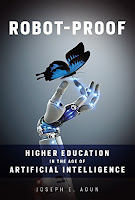Joseph E. Aoun, President of Northeastern University, is calling on higher education to adapt to the times and change its teaching and learning models rapidly to ensure that students learn not only the traditional content but learn how to learn and how to be creative to allow for their success in a world that is more and more shaped by robots, computers, and ever-improving artificial intelligence (AI).
He is delineating 3 literacies and 4 cognitive capacities that, combined, allow for students to become creative life-long learners in a world with the potential to give humans the possibility to create solutions for new problems, invent new products, and improve life for everyone. This subject to teach he calls humanics.
The literacies and cognitive capacities are
1. technological literacy: knowledge of mathematics, coding and basic engineering principles,
2. data literacy: data analysis with an emphasis on the context,
3. human literacy: knowledge and skills of interacting successfully with other, diverse people
and
1. critical thinking: "analyzing ideas skillfully and then applying them fruitfully" (62),
2. systems thinking: connecting different sets of thoughts, systems in (unexpected and creative) ways,
3. entrepreneurship: the "means for people to distinguish themselves in the digital workplace" (66),
4. cultural agility: "the mega-competency that enables professionals to perform successfully in cross-cultural situations" (70).
Higher education needs to give students the opportunity to learn and practice these 7 facets, including the practice of learning through mistakes and failure in a relatively safe environment. Active learning in its various appearances will help provide students with some of these experiences, including study abroad and internships/co-op positions.
Higher education needs to provide students with new ways of learning, moving away from the one path to one degree and create opportunities for quick immersions (bootcamps), personalized learning (online), and a more customized slate of learning experiences leading to a degree and various credentials.
Higher education needs to realize more effectively that it does, as a whole, spend its resources and people power on teaching, not on research. Some of his numbers show that of the ca 1.5 million college and university employees in the US who work in instruction, research, or public service - so not administration and support - 1.2 million are primarily instructors. 270,000 balance research with teaching, and 65,000 do research only. The numbers of pure instructional staff are growing (131).
Some of the challenges to overcome are
1. robotics and AI are replacing humans in repetitious and time-consuming positions. This means that the concept of working your way from the bottom up in, say, a law firm, may no longer be the case as these boring entry-level positions are no longer needed. How, then, will we gather the necessary experience? Co-Op opportunities seem one opportunity, but can we really make this possible for all students in meaningful ways?
2. How can we guarantee such a meaningful education for the 21st century for every single person on earth? And if that is not the goal, how are we going to provide for the potentially millions, if not billions of people who cannot participate in this system?
I think the book raises interesting questions that need to be brought into the discussion of where higher education is going - I am wondering if it needs to be applied to all of education to ensure that all human beings can benefit from these ideas.

No comments:
Post a Comment